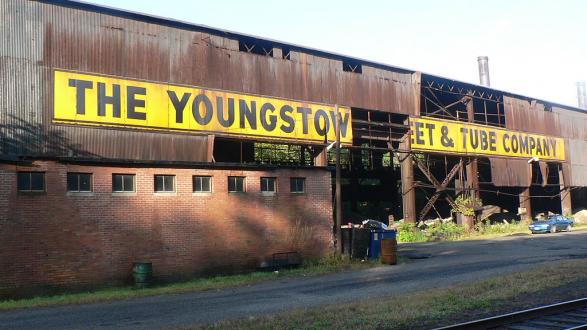In:
Global Beat is your weekly stop for news from around the world. Join us every Friday morning for important stories you should know about.
This week, President Trump introduces tariffs on aluminum and steel; Italy elects an entirely new government; the crisis in Syria continues; and more.
____________________
Americas
President Trump's recent proposal of tariffs on imported steel and aluminum have come under fire. Designed to counter China, these tariffs will hit allies like the European Union, Brazil, and South Korea, who export more metal to the U.S. than China does. The Republican Party and much of the business community have criticized the Trump Administration for this move, which has resulted in proposed retaliatory tariffs coming from the EU. Some Democrats from "Rust Belt States" have been more supportive. Politically, economically, and culturally sensitive goods and districts have been proposed targets of these response tariffs: Harley Davidson motorcycles, manufactured in House Speaker Paul Ryan's home state; Kentucky bourbon, from Senate Majority Leader Mitch McConnell's home state; agricultural products like Florida orange juice; and Levi Strauss jeans.
Also check out:
Central & South Asia
India's tech hub Bangalore could be the next major city to run out of water after Cape Town, South Africa. In February, the BBC reported that 85 percent of the city's water could only be used for irrigation and machine cooling, rendering only 15 percent of Bangalore's water supply drinkable. Bangalore and the encompassing state, Karnataka, have been involved in a water dispute with neighboring state Tamil Nadu over water resources from the Cauvery river. In 2016, a "water war" broke out between residents of the two states fighting over water resources, resulting in mass protests and bus bombings. Amidst the tech-boom, Bangalore has developed quickly and seen a massive influx of residents, going from 9 million inhabitants in 2012 to about 11 million now.
Also check out:
- Afghanistan's fragile government picks a dangerous fight - The Economist
China & East Asia
On March 8th, President Trump agreed to have a summit with North Korea's Kim Jong-Un and other high-ranking officials. Announced by the South Korean delegation in Washington, the summit is expected to take place by the end of May. Analysts are concerned with the risk of rushing into negotiations without being fully prepared for North Korea's posture, demands, and areas of flexibility. In the past, North Korea has asked for concessions like aid, oil, and lifting of sanctions. Dr. Robert Malley of the International Crisis Group recently spoke to the Pacific Council on threats from North Korea - you can read some of his comments here.
Also check out:
Europe & Russia
Economic woes and anxiety over immigration has brought the populist wave to Italy, sparking concerns from the Vatican. Elections to bring in an entirely new government took place Sunday, March 4, with the greatest share of votes going to two anti-establishment, populist parties: the Five-Star Movement (M5S at 32.2 percent) and The League (formerly the Northern League, a northern secessionist party at 17.7 percent). The Democratic party was the party in power, and fared worse than expected. A government has yet to be formed, though talks from all sides on further coalition-building are underway.
Also check out:
Middle East & North Africa
A ceasefire in Syria brokered by the United Nations Security Council has fallen short. A UN-backed convoy of Syrian Red Crescent aid-trucks entered the rebel enclave of Eastern Ghouta during the supposed ceasefire, but had to quickly leave the area as fighting resumed. The aid trucks are unable to ensure the safety of their teams, and had to leave the area as night fell and fighting intensified. UNICEF has described the situation in Ghouta as "hell" for children, citing malnourishment and an inability for rebels or government forces to ensure their safety. Furthermore, the Syrian Government claims it is preparing to slice the region in two, isolating separate rebel factions, which have moved toward guerilla-style tactics, while the government has reportedly used chlorine gas attacks against the rebels.
Also check out:
Southeast Asia & Oceania
Migrants displaced by climate change have, so far, not been given refugee status by the United Nations refugee agency, UNHCR or the UN Development Program. The UNHCR claims it is already pushed to its limits in processing requests for refugees. The government of New Zealand, however, will allow asylum-seekers displaced by the effects of climate change to receive protected status. Migrants already pose an economic dilemma to many countries in Southeast Asia, with about 7 million migrant workers in the region. More displaced, vulnerable people without protected status could strain Southeast Asian states even further. Projections on the number of migrants displaced by climate change by 2050 have ranged from 25 million to a billion.
Also check out:
-
Sri Lanka blocks social media as deadly violence continues - The Guardian
Sub-Saharan Africa
U.S. Secretary of State Rex Tillerson is in Africa this week, and has pledged that the United States will give $533 million in aid to victims of drought and conflict in Ethiopia, Somalia, South Sudan, and the West and Central African countries bordering Lake Chad. Africa experts say Tillerson's planned stops in Ethiopia, Djibouti, Kenya, Chad, and Nigeria place an emphasis more on security than aid, good governance, and human rights, which had previously been at the forefront of America's diplomatic missions in the region. Secretary Tillerson also warned African countries about "predatory loans" coming from China.




